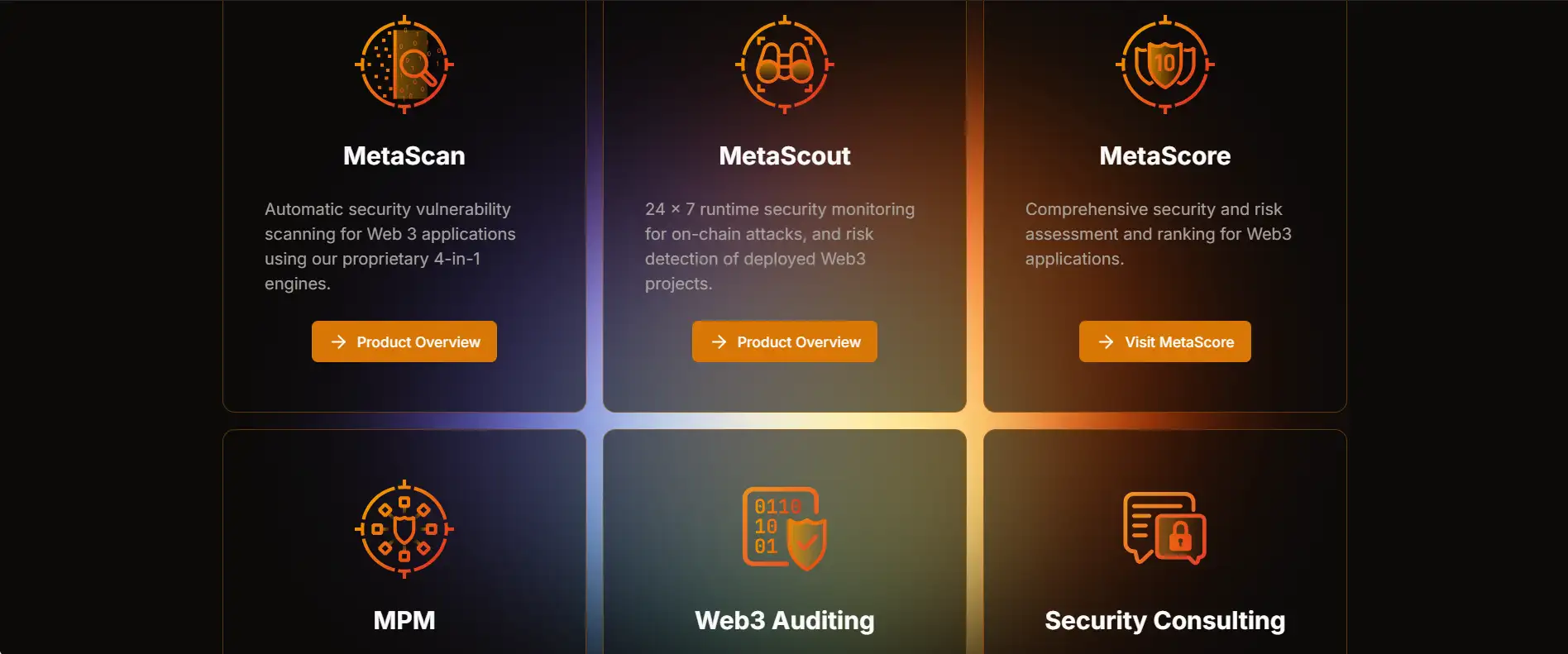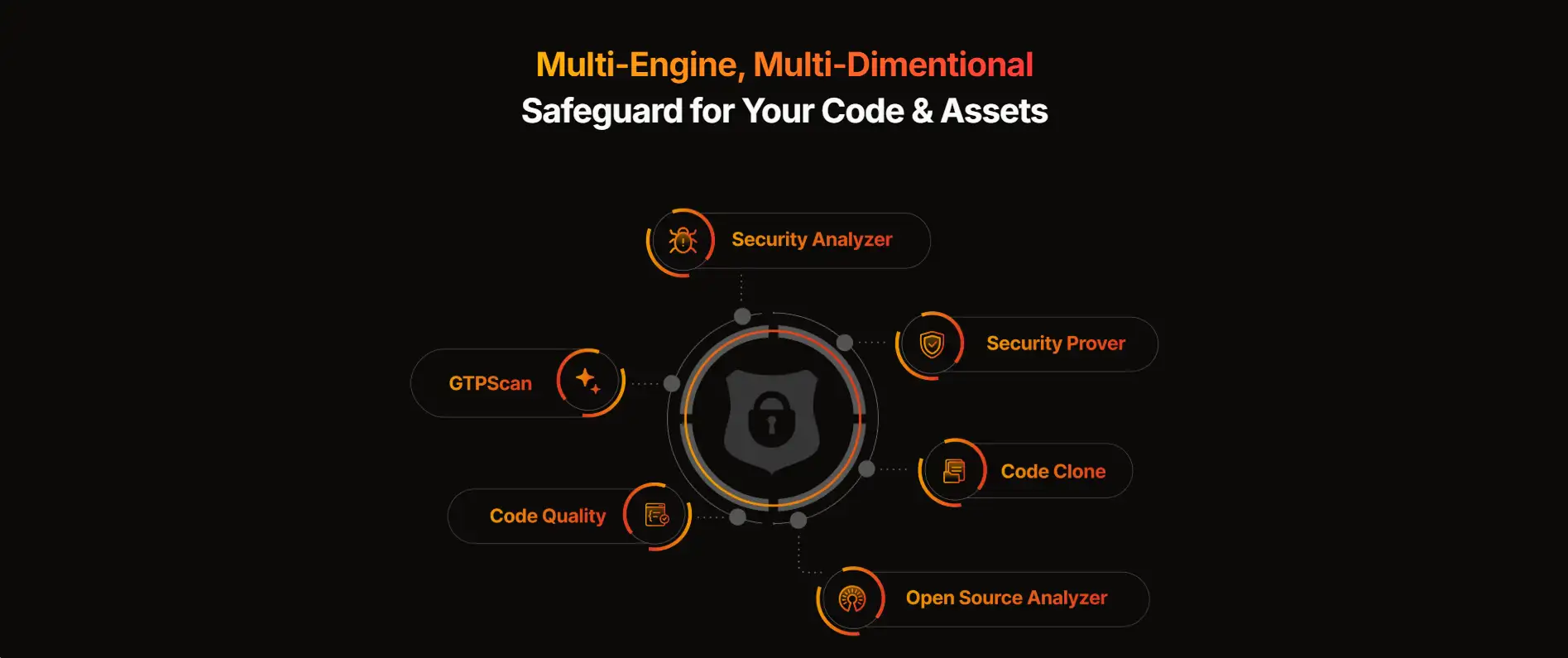About MetaTrust
MetaTrust is a cutting-edge Web3 security platform designed to empower developers and projects by offering automated, AI-powered tools to detect, prevent, and remediate vulnerabilities in smart contracts and decentralized applications. Born from research at Nanyang Technological University, Singapore, MetaTrust brings together academic excellence and real-world expertise to tackle the growing need for comprehensive blockchain security. With a strong focus on secure software development practices, the platform ensures developers can build rapidly while maintaining trust and compliance across every layer of their projects.
From smart contract audits to continuous on-chain monitoring, MetaTrust provides robust protection at each stage of the software development lifecycle. Their suite of products — including MetaScan, MetaScout, and MetaScore — delivers full-spectrum insights, using AI, formal verification, and deep security scanning engines to give developers the peace of mind they need. Trusted by major platforms like Bybit, Uniswap, BingX, and Scroll, MetaTrust is solidifying its place as the security layer of choice for the next wave of Web3 innovation.
MetaTrust has positioned itself as a mission-critical infrastructure provider in the Web3 ecosystem, with a core focus on proactive, automated, and AI-enhanced security. As blockchain adoption expands, smart contract vulnerabilities remain one of the biggest threats to user funds and application integrity. MetaTrust addresses this with a vertically integrated suite of tools and services that protect every stage of decentralized development.
One of the platform’s flagship tools is MetaScan, a multi-engine scanning system that uses static analysis, logic-aware GPT evaluation, formal verification, and open-source code assessment. Its unique combination of traditional code analysis with AI-based techniques helps identify even deeply embedded flaws like migration attacks, logic traps, and execution inconsistencies. GPTScan is particularly innovative — using ChatGPT-like intelligence not just to generate reports, but to understand contract behavior and scan for security red flags across patterns and variants.
The MetaScout product adds an additional layer of real-time defense by enabling 24/7 runtime monitoring of on-chain activity. Projects can set up alerts, detect abnormal transactions, and respond to threats such as exploit attempts, unexpected privilege escalations, or token draining in real time. This monitoring system is ideal for live DeFi projects and consumer-facing applications where security events must be addressed proactively.
In addition to detection and defense, MetaTrust also supports security benchmarking through MetaScore — a comprehensive rating system that evaluates a project’s codebase and operational security posture across various dimensions. Developers and investors alike use MetaScore as a reference point for trustworthiness, especially during token launches, audits, and VC due diligence processes. The visual radar-style scoring helps simplify technical audits for non-developers.
To extend its influence and improve developer trust, MetaTrust also offers the upcoming MPM (MetaTrust Package Manager) — a secure, open-source smart contract package hub aimed at improving how Web3 teams discover, share, and reuse trusted components. This initiative is expected to bring structure and reputation-based trust to an otherwise fragmented ecosystem of Solidity libraries.
Compared to traditional auditing services such as Trail of Bits, Consensys Diligence, or CertiK, MetaTrust differentiates itself with affordability, automation, and developer-first integration. Its ability to offer affordable audits, scan up to 200K+ lines of code per month, and integrate seamlessly with IDEs like Remix gives it an edge for fast-moving projects.
With robust academic backing, cutting-edge tooling, and real-world adoption across exchanges, DeFi apps, and infrastructure providers, MetaTrust is defining what modern Web3 security looks like — fast, proactive, intelligent, and deeply embedded into the developer workflow.
MetaTrust provides numerous benefits and features that make it a standout solution in the Web3 security space:
- Multi-Engine Security Scanning: MetaScan leverages static code analysis, AI-powered logic analysis, and formal verification to catch a wide range of vulnerabilities across all layers of smart contracts.
- AI-Augmented Detection with GPTScan: The GPTScan module utilizes deep language model capabilities to detect non-trivial logic flaws and attack vectors even when code has been refactored or obfuscated.
- Real-Time Runtime Monitoring: MetaScout enables 24x7 protection through live monitoring of smart contracts, alerting developers to high-risk activities as they occur.
- Security Ratings for Trust & Visibility: MetaScore generates visual, multi-dimensional security ratings for projects, improving transparency for users, investors, and ecosystem partners.
- Developer-Centric Integrations: With IDE plugins, Git integrations, and full API access, MetaTrust seamlessly embeds security into developer workflows without friction.
- Cost-Effective Solutions: MetaTrust’s pricing model — including free scans and low-cost subscriptions — democratizes access to security tools even for small teams or indie developers.
- Open Source Package Manager (MPM): Upcoming support for secure smart contract libraries allows teams to reuse and share high-quality, verified code packages safely.
Getting started with MetaTrust is simple and built with developer-first usability in mind. Whether you're looking to scan your first smart contract or monitor an entire protocol, MetaTrust offers quick onboarding and deep integration.
- Step 1 – Visit the Website: Go to MetaTrust.io and click on “Try MetaScan” or “Book a Demo” to begin.
- Step 2 – Create Your Account: Register using your email or GitHub login to set up your workspace.
- Step 3 – Start a Project Scan: Upload your code via a ZIP file or connect a public/private GitHub or GitLab repository. You can configure which security engines to apply.
- Step 4 – Review Results: Once the scan is complete, you’ll get a detailed breakdown of all findings, categorized by severity. Each vulnerability comes with remediation suggestions.
- Step 5 – Enable Runtime Monitoring: Use MetaScout to monitor your live contracts for suspicious behavior and receive alerts directly in your dashboard.
- Step 6 – Get Rated: Enable MetaScore for your project to receive a complete security assessment and share the score with your stakeholders.
- Step 7 – Explore Documentation: Visit the MetaTrust documentation section for in-depth guides, integration tutorials, and security methodology papers.
MetaTrust FAQ
MetaTrust integrates GPT models into its proprietary GPTScan engine, which enables semantic-level understanding of smart contract logic. Unlike traditional static analysis tools, GPTScan can recognize vulnerabilities even when variable names and flows have been altered, thanks to natural language modeling. This means it can detect nuanced, logic-based vulnerabilities that other scanners often miss, making MetaTrust ideal for projects using complex or unconventional smart contract patterns.
MetaScout provides continuous runtime monitoring for deployed Web3 applications by tracking live on-chain activity. It can detect events like contract upgrades, flash loan attacks, and abnormal token transfers as they happen. The system is optimized for DeFi protocols and includes risk scoring and automatic alerting. This ensures that protocols monitored by MetaTrust can respond instantly to malicious behaviors, minimizing damage and loss.
Yes, MetaTrust uses a specialized engine known as Code Clone Detection to identify cloned code across deployed contracts. This is particularly useful in detecting migration attacks or vulnerabilities inherited from third-party templates. By comparing structural and semantic code similarities, MetaTrust helps developers pinpoint reused logic that may carry undetected flaws or outdated practices.
MetaScore is a scoring system that visually represents a Web3 project’s security across dimensions such as code quality, runtime behavior, and vulnerability presence. It converts technical findings from MetaScan and MetaScout into radar-style charts and easy-to-digest grades. This allows project teams and VCs to evaluate security posture at a glance on MetaTrust, improving decision-making without requiring deep technical knowledge.
Yes, MetaScan offers full RESTful API support, allowing developers to embed security scans into their CI/CD workflows. Projects can automatically trigger scans on each commit, push, or release — and receive detailed vulnerability reports immediately. This automation makes MetaTrust a powerful security checkpoint within agile development pipelines, promoting continuous delivery with minimal risk.
You Might Also Like












